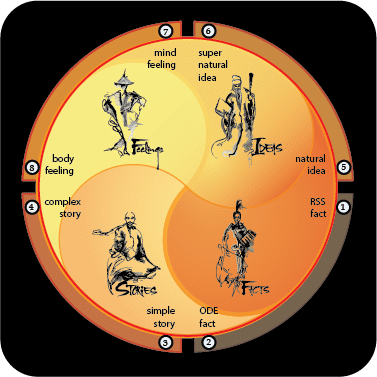Is Popper’s Deductive Method Too Basic?
Basic?
Not really.
For instance, one of Popper’s main drives appears to be what at first glance seems to be a simple question: How do we differentiate between science and pseudoscience? To me, that he posited a possible solution to this problem is an act of courage. That he dared to find fault in the 1930’s with the then-seen-as scientifically stated theories of Freud, Adler, and Marx (as compared to Einstein’s work) is equally courageous.
The thing is, Popper ultimately fails to scientifically state this difference. Clearly, he loves logic and disdains metaphysics. Yet he fails to see that the natural world is inherently illogical (e.g. try using logic to describe a cumulus cloud) and that words themselves are inherently metaphysical (as opposed to logically clear and certain entities).
He also refers to falsifiability. But he never addresses the other side of the coin – Descartes’ idea: that you can know something is true or you can know you cannot know. But you can never know if something is false.
More significant still is, while I so agree with Popper’s choice of Einstein as a poster-boy for real science, Popper fails to sufficiently tell us why. In doing so, he fails to address many of the aspects of the scientific method which even today are far more problematic.
For example, one thing Einstein does exceptionally well is, his theories, by design, use science to define his terms (as opposed to employing dictionary-style definitions). In his critiques of Freud and such, Popper never mentions this, let alone offers a solution to this “definition” problem.
Also, because Einstein’s formulas define his terms such that they function like fractals (rather than like “linearized” versions of nonlinear things), by design, his formulas encompass the full scope of possibilities at his reference scale. In other words, within the scope of his statements, they omit nothing (e.g. energy equates to mass moving).
Of course, like all currently accepted versions of the scientific method, Popper also fails to address the greatest flaw of all: None of these methods scientifically define a clear and certain path on which to make discoveries. Ultimately, while I admire Popper’s mind and courage then, the idea that the scientific method as currently practiced still more resembles a hit and miss process than actual science makes it science’s greatest “elephant in the room.”
It is also the underlying cause for the problem Popper raised; how do we differentiate between actual science and pseudoscience?
The answer? Impossible to state in such brief quarters. However, I’ve hinted at it in what I’ve written. Actual science sees the two things Einstein does so well as absolutely essential and necessary. It also defines a clear and certain path on which to make discoveries.
Even based on these few criteria (and despite my admittedly provocative claim that the significant advances made by this science are mostly accidental), sadly, much of the way present-day science is practiced is patently pseudo-scientific.
